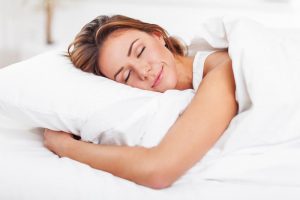602-954-8200
Finding Effective Treatment for Sleep Apnea in Phoenix, AZ

Most people – male and female – snore occasionally. It may be a result of temporary sinus congestion from allergies or a head cold, falling asleep in an awkward position, or having a little too much to drink. If your snore is frequent and loud, though, you could have obstructive sleep apnea or OSA. You might be surprised to learn that effective treatment for this condition is as close as your trusted dentist, Dr. Justin Frost at Biltmore Dental Center in Phoenix, AZ.
Understanding Sleep-Disordered Breathing
Obstructive sleep apnea is the most common of the serious health issues classified as sleep-disordered breathing. When a person with OSA begins to fall asleep, neck muscles relax. The tongue and soft tissues at the back of the mouth lose support and collapse into the opening of the throat. The airway, or path that each inhaled breath follows from the nose and mouth to the lungs and back out again becomes constricted. That is what causes the whistling, vibrating, grunting, howling, barking, honking, or roaring sounds of snoring.
While the noise from an OSA snore may interrupt sleep, it is not only health risk associated with the condition. As the airway closes, breathing becomes shallow and it may even cease for a few seconds up to a few minutes. Blood oxygen saturation drops drastically. Just as if you were drowning or being choked, your brain senses danger. It sends a blast of adrenalin to activate your fight or flight survival instinct. That causes you to jerk into wakefulness. You may reposition or get up to use the restroom. Then, as you resume sleep, the cycle repeats. A severe apneic has dozens of episodes per hour, preventing normal sleep patterns.
Often a person with OSA does not realize he or she has the condition, and not every apneic snore. It is important to ask your sleep partner and family members, and to assess the following list of symptoms to determine if you should seek treatment:
- Insomnia
- Loud persistent snoring, often regardless of position
- Jerky movements during sleep
- Choking and gasping during sleep
- Odd sleep positions
- A lot of movement during sleep
- Frequent awakenings
- Waking with a headache or migraine
- Dry or sore throat in the morning
- Fatigue through the day
- Falling asleep at inappropriate times
- Sleepiness when driving
- Workplace or vehicular accidents
- Obesity
- Depression
- Mood changes
- Forgetfulness
- Decreased libido
- High blood pressure
- Cardiovascular disease
- Behavioral problems, ADD, or ADHD in kids.
Why Men and Women in Phoenix, AZ See a Dentist for Sleep Apnea Treatment
Your journey to healthier sleep begins with a physician’s evaluation. The sleep study is performed to determine if you have sleep apnea and to rate severity.
Sleep apnea was discovered in 1965. Initially, surgical solutions were recommended – correction of a deviated septum, removal of soft tissue from the throat and palate, the advancement of the upper and lower jaws, or surgical modification of other facial and oral structures. Though some of these surgeries are indicated for easier breathing, the overall success rate for improvement in OSA was not great.
The first CPAP (continuous positive airway pressure) machine was invented in 1980. This device holds the airway open with air pressure. While it is effective when used regularly, compliance is not good. It simply isn’t easy for most people to sleep next to a bedside compressor while tethered to a nasal mask.
Dr. Justin Frost’s patients are fortunate to have a dental treatment option that is comfortable and very effective. A specially-designed oral appliance is custom-fitted to gently keep the airway open and improve natural breathing. This small, discreet splint fits over front teeth holding the mouth open just a bit and the lower jaw slightly forward. Depending on your needs, it may also depress the tongue. Just insert it before you fall asleep and give it a rinse in the morning. It slips into your pocket, handbag, or carry-on luggage easily for healthful sleep anywhere.
The device resolves or dramatically improves sleep for mild to moderate cases of OSA. Those with severe sleep apnea may get improved results wearing an oral appliance in conjunction with CPAP.
Learn more about the nonsurgical, non-invasive treatment for sleep apnea available at Biltmore Dental Center in Phoenix, AZ. Call (602) 704-0659 for an appointment with Dr. Justin Frost.
